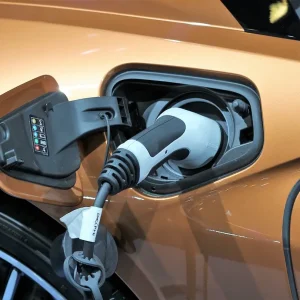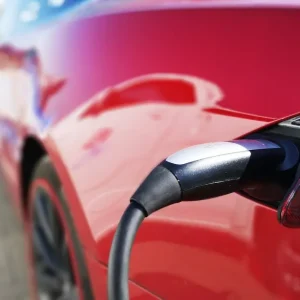New rules requiring a rising share of manufacturers’ new cars to have zero tailpipe emissions are moving closer to implementation.
The UK Government has published a final consultation on its Zero Emission Vehicle (ZEV) mandate.
The government is proposing a new regulatory framework, which will require an increasing share of manufacturers’ cars and vans to be zero emission annually, alongside a CO2 emissions regulation to ensure that the rest of their cars and vans do not become more polluting in future years.
The government says the initial tranche of regulation will cover the period from 2024 through to 2030.
The proposed mandate for cars will begin with 22% of sales being ZEVs in 2024, rising gradually to 80% in 2030 – and subsequently to 100% in 2035 under future legislation.
The ZEV mandate for vans will begin at 10% in 2024, and rise to 70% by 2030 – and also subsequently 100% by 2035.
The mandate will apply to all manufacturers, except for those selling fewer than 2,500 vehicles annually. Each year, manufacturers will receive allowances to sell non-ZEVs up to a given percentage of their fleet of new cars and vans, with the intention that ZEVs account for the remainder of sales. Any excess non-ZEV sales will have to be covered by purchasing allowances from other manufacturers, using allowances from past or future trading periods during the initial years of the policy, or offsetting with credits.
Manufacturers which do not comply face fines of £15,000 per non-ZEV car and £18,000 per non-ZEV van.
Extra credits will be on offer for vehicles deployed with car clubs, or those that are wheelchair accessible.
To qualify as a ZEV, the government says a vehicle must emit no CO2 or any other targeted greenhouse gases at the exhaust, have a minimum range of 120 miles (according to the official WLTP test standard), and meet certain minimum warranty requirements – criteria it says are met by the vast majority of ZEVs currently on the market.
Regarding the previously announced ban on new pure petrol and diesel vehicle sales from 2030, but with hybrids with significant zero emission capability (SZEC) continuing until 2035, the government says it cannot yet provide a detailed definition of SZEC, but intends to set out its approach in the middle of this year, with the related commitments unchanged.
The new ZEV mandate consultation will run until 24 May, with the government’s response to be published within three months of that date.
Reacting to the announcement, the BVRLA has welcomed what it called “essential clarity and certainty for the fleet and mobility services sector”, and said it was pleased its own requests regarding car clubs and wheelchair accessible vehicles had been taken up.
The rental and leasing industry body’s chief executive Gerry Keaney said: “The ZEV mandate is a critical tool in the UK meeting its ambitious Net Zero targets. The clarity given today will give fleets and motorists the confidence to continue their decarbonisation journey and accelerate the transition to zero emission transport.
“BEV demand is growing – driven by company car fleets – where over 50% of new registrations are electric.
“We now need supply to keep pace by providing a wider range of vehicles at all price points. The ZEV mandate will help to ensure the right vehicles are coming to the UK, allowing more drivers to make a swift switch to electric.
“We look forward to working with the government as it implements this mandate and monitors the impact on the new vehicle market.”
Society of Motor Manufacturers and Traders chief executive Mike Hawes said: “Automotive is on track to deliver zero emission motoring, so we welcome this long-awaited consultation on a watershed regulation for the UK new car and van market. We want regulation that gives consumers choice and affordability, and enables manufacturers to transition sustainably and competitively.
“While the proposals rightly reflect the sector’s diversity, late publication and lack of regulatory certainty make product planning near impossible, and the continued lack of clarity as to what technologies will be permitted beyond 2030 undermines attempts to secure investment.
“The UK new car and van market is already moving at pace towards electrification, the result of massive investment by manufacturers and increased consumer demand. If the UK is to lead the global race to zero emission mobility, however, it must go further and faster in unlocking infrastructure investment, incentivising EV ownership and helping ensure more of these vehicles are developed and built in Britain.”
Nick Williams, transport managing director for Lloyds Banking Group, including Lex Autolease and Black Horse, said: “Reaffirming the commitment to the ZEV mandate is a bold step forward from the government and sends a clear message to both industry and drivers that the future of motoring is electric.
“Today’s consultation announcement is a step closer to understanding how the plans will work in practice but, as ever, the devil remains in the detail.
“With nine months to go until it comes into force, the new ZEV mandate will increase the availability of electric vehicles and create greater competition in the market, providing drivers and businesses with more choice. Importantly, the mandate will boost the used car market, making EVs more affordable and accessible, while driving investment in the UK.”
Giving her reaction, Octopus Electric Vehicles CEO Fiona Howarth said: “The wheels for the EV revolution are firmly in motion. The ZEV mandate will set the roadmap towards 2030 zero emissions transport – cutting harmful emissions for both people and the planet.
“The industry needs clarity and decisive action to place the UK EV market in pole position. We need to end our reliance on imported fossil fuels as we transition to zero emission vehicles powered by homegrown green energy.
“The devil will be in the detail, and this is our chance to further drive down costs and encourage new models to enter the market, giving drivers access to cheaper, greener, tech on wheels transport.”
As well as the new ZEV mandate consultation, the government has also announced the launch of its £381million Local Electric Vehicle Infrastructure (LEVI) fund, alongside an additional £15million for the On-Street Residential Charging Scheme (ORCS).
The government says that taken together, this funding will support the installation of tens of thousands of new chargers across the country.
Technology and Decarbonisation Minister Jesse Norman said: “As today’s announcements show, the government is doing more than ever to help the UK move away from petrol and diesel and towards electric vehicles.
“That means investing in charging infrastructure and giving a clear direction to manufacturers, so they can roll out new electric vehicles faster and more efficiently.
“Overall, the UK is leading the way in decarbonising transport, a sector that is one of the biggest contributors to greenhouse gases.”





